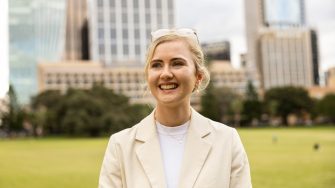A guide to future-proof skills
Skills that go beyond textbooks and technical knowledge can make all the difference in your career.
Skills that go beyond textbooks and technical knowledge can make all the difference in your career.

Future-proof skills can help you stand out in a crowded market, make a major impact in your industry and transcend location and time. We spoke with three UNSW alumni about how their postgraduate study helped them prepare for their careers. Here are their top five future-proof skills that are essential for working life.
Critical thinking is the skill of thinking carefully about a topic. It involves analysing and evaluating to make improvements. For our alumni, it was clearly the top skill they learned while studying. This skill is now essential for their jobs.
“Critical thinking is a fundamental thing,” says Nolan Yu, Senior Account Manager at OMD and Master of Commerce (Extension) alum. “You need to stay curious and question everything. You observe.”
“It wasn’t a natural thing for me. It’s a mindset. It’s a behaviour you need to develop. The environment and initiatives in the [UNSW] classes challenge you, so you start to develop critical thinking. I reset how I process information. It was probably the most valuable thing I learned,” he says.
“It really benefited me in the workplace. Critical thinking can enable you to approach a task differently. It definitely benefited my career. And it changed me as a person.”
For Tameka Lee, the experience was very similar. As a Consultant for World Bank Group and Master of Policy alum, critical thinking was “very much a focus.”
“Critical thinking was something we were challenged to use a lot,” she says of her time at UNSW. “I have that mindset now that I have to think critically. I have to come up with new and innovative things and ideas.”
“In terms of critical thinking, it has helped me in those areas that are critical for my job right now.”
Jansen Che, Architect for Johnson Pilton Walker and graduate of the Master of Architecture, goes even further. He suggests that critical thinking was the number one reason to study at university. “To learn to think by yourself, to learn to analyse – I really resonated with that,” he says. “And I got that from UNSW.”
The ability to think differently is the foundation of another skill essential for future work: creativity.
“It’s helped me think more outside of the box. It’s helped me be more creative,” Jansen says.
Studying different parts of his industry has helped Jansen see his work as an Architect in a new way. This experience has improved his ability to design with purpose and from a unique perspective.
“We got a global perspective. It helped me be more open-minded and see things in different ways. I think it all adds to helping you become more creative, by seeing things from a different perspective,” says Jansen.
Nolan agrees: “Being able to think differently can really benefit you in the long run. It’s about creativity; it’s about innovation,” he says.
Tameka's ability to create change has allowed her to turn her passion into action. This has helped her make an impact in her career. As a consultant for the World Bank, she established a clean technology enterprise incubator for the Caribbean.
“This post called for innovation – innovative thinking, innovative mindset and all of those things,” she says.
“I was able to bring that experience to the job. To challenge the status quo and elevate the job specs and to bring freshness and innovation to the job as well, based on the experience I got in university.”
Lifelong learning and continuous curiosity, Nolan says, are “very important in the real world.”
“UNSW equips you to adapt to the real world when you’re doing their program,” says Nolan.
“Having an attitude to learning new things is fundamental in fast-paced industries. I was really prepared for that in my degree, especially through group assignments and a lot of presentations,” he says.
“Group assignments gave us a great learning opportunity. We learned from and competed with talent from all around the world. It’s not just sticking to my comfort zone and staying in my little bubble; it’s about having the flexibility to change your ways.”
Nolan’s ability to learn quickly has helped him to succeed and rapidly grow his career.
“During my first year in marketing, I won an award for a major competition within the industry. I had less than one year’s experience. It helped me build my profile in the industry and further my career. I became a Senior Account Manager in just three years.”
And being flexible will always be important, says Tameka. “Go in with an open mind. You will still have to be trained on the job for the specific role that you’re going into.”
For our three alumni, university was the ideal place to improve their teamwork skills. They learned to communicate, be aware, show empathy, and work together effectively.
“There’s a lot of interaction in the learning process,” Nolan says. “We had a lot of group assignments, which is fundamental to the working environment, especially working in marketing. It’s all team-based.”
“You have to work with people of different cultural backgrounds, different language proficiencies and different work experience. To navigate and overcome barriers and then present work together, it’s a challenging and rewarding process.”
If you have any questions about studying at UNSW or how you can make your studies work for you, contact us below. We’re here to help.